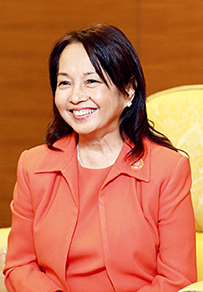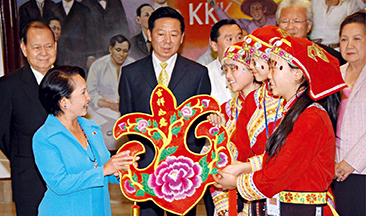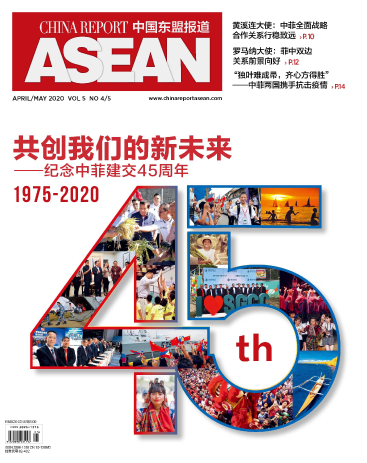She still lights up the room at virtually every public appearance with a radiant smile and sparkling eyes. The Philippines’ Gloria Macapagal Arroyo, known as the “Iron Lady of Asia,” was once listed among the “Most Powerful Women in the World.”
Daughter of former Philippine President Diosdado Macapagal and a professor of economics, Gloria Macapagal Arroyo lectured at multiple universities before launching a political career in 1992 with a run for senator. In 1998 she was elected Vice President while holding a concurrent cabinet position as Secretary of Social Welfare and Development. From 2001 to 2010, she served as President of the Philippines. In July 2018, Arroyo returned to the political limelight as the new Speaker of the House of Representatives. Over the years, she has continued tireless efforts to advance China-Philippines relations.
How does this political veteran see China’s development?
Breathtaking Changes in China
“Breathtaking” is how Arroyo describes the changes happening in China, after having followed its development for more than 40 years—even before China launched reform and opening-up.
“In the first years after China introduced reform and opening-up policy, I was Undersecretary of Trade and Industry, so we were closely monitoring China and its new economic development patterns as it rose to economic prominence,” recalls Arroyo. She first visited China in 1975, the year it established diplomatic ties with the Philippines. Earlier, Arroyo co-founded the Association for Philippines-China Understanding, which has continuously played a significant role in promoting bilateral relations to this day.
“We were very fortunate to have visited several cities that are still important today,” she adds. “We went to major cities such as Beijing, Shanghai, Guangzhou and Hangzhou, as well as Dazhai [a northern Chinese village deemed a model for agricultural production during the 1960s and 1970s]. My impression before 1978 was that life was very simple in China. People all wore Mao suits instead of the latest fashions. People rode bicycles instead of the modern transportation. That gave me a strong impression of the economic situation in China.” During her nearly decade-long tenure as president of the Philippines from 2001 to 2010, Arroyo visited China almost every year to promote ties between the two countries and witness the monumental changes happening in China.
Arroyo believes China completed a great leap from “catching up with the times” to “leading the times,” as it continues to set a pace never before seen. “One of the greatest accomplishments of China is the greatest poverty alleviation in human history, because 800 million Chinese have gradually shaken off poverty since the late 1970s,” she asserts.
Dreams Come True
“Looking closely at China’s reform and opening-up can provide insight on China’s historical perspective and long-term planning for national development,” opines Arroyo. She believes that as an advocate of globalization, free trade and openness, China has successfully received the baton of globalization as it continues reform and opening-up.
“When China was just beginning to develop in 1978, some were already fearful that the country would become a rival—not realizing that China was in a class of its own,” illustrates Arroyo. “The world should look at China’s rise as an opportunity instead of a threat. Not only has China set a completely new development paradigm, it has also become a partner for cooperation and sharing development experience. China’s rise has been beneficial for the Philippines and the rest of Southeast Asia. In the new era, China will become increasingly influential in the region and world.”
As president of the Philippines during its turn at the rotating ASEAN presidency, Arroyo delivered a keynote speech, in which she remarked that ASEAN must seek deeper cooperation with China, India and Japan to achieve broader economic integration, at the 2007 Boao Forum for Asia (BFA) annual conference. “Now, many of those ideas have been realized, and I’m very happy to see my dream come closer to reality,” she smiles.
China’s Belt and Road Initiative (BRI) has kindled development opportunities for all countries involved, with infrastructure building and trade and investment facilitation opening channels for projects to be completed faster and more efficiently. Such a structure has been popular in the Philippines. President Duterte’s “AmBisyon Natin 2040” vision is highly complementary with the BRI, a framework for opening avenues for multilateral cooperation. Since the Philippines is still coping with slow development of hardware infrastructure such as railways and ports, the BRI has been creating tremendous opportunities for trade and economic cooperation and shared development.
“China and the Philippines should maintain practical cooperation in every sector as friendly neighbors to deliver benefits to our peoples,” Arroyo stresses.
China a Partner
“As President Xi Jinping remarked, even though China has come a long way, it still faces new challenges on the road ahead,” Arroyo notes. She believes the world should also be aware of various challenges facing China. Only by learning about China’s concerns can others really understand China’s independent foreign policy of peace, which mirrors China’s hope for maintaining a peaceful external environment to sustain its development.
President Xi’s remarks during his keynote speech at the opening ceremony of the BFA Annual Conference 2018 remain fresh in Arroyo’s mind: “No matter how much progress it has made in development, China will never threaten any other country, never attempt to overturn the existing international system and never seek spheres of influence.” She believes that the world should understand that China’s development presents an opportunity, not a threat. This simple truth, however, may take a long time for the international community to truly understand.
So, what does China’s rise mean for the world? Arroyo offers an answer based on her 45 years of relations with China: Rather than a rival, China is an important partner and a provider of capital and technology for developing countries. At the same time, it is also a powerful advocate for globalization and building a community of shared future for mankind.
“I also hope the international community observes China with patience,” she says. “A Chinese saying goes, ‘Time reveals a person’s heart.’ Let time testify to the significance of China to the world.”

Gloria Macapagal Arroyo

Gloria Macapagal Arroyo, then president of the Philippines, receives gifts from members of a visiting delegation of middle school students from earthquake-stricken areas of China’s Sichuan Province on January 16, 2009, in Manila.


 Copy Reference
Copy Reference